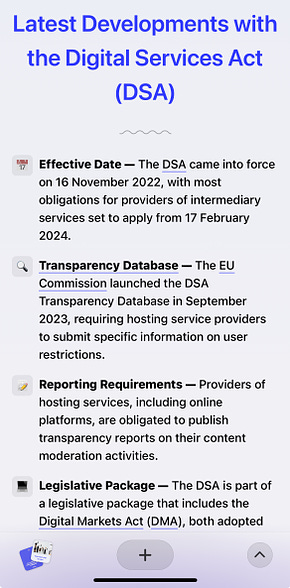Horrific-Terrific - Never visit a website again
Hello, I was on the Tech For Good Live podcast this week; I’m pretty sure my episode will be out by the time you read this, so go here to listen to it . They were very nice and I really enjoyed myself. Feel free to invite me to be a guest on your podcast, I am a delight. Also a reminder that if someone forwarded this email to you, you have the power to subscribe to it yourself, all you have to do is click this button 👇 At the beginning of February, The Browser Company released Arc Search, which is a kind of pared-down mobile version of their very fancy Arc browser. It emphasises the ‘browse for me feature’ which is where you search for something, and it calls on a range of AI models to gather information from multiple websites at once and synthesise it into a simple and easy to read piece of text littered with emojis. I’ve used it a bit, it’s not THAT good, but it’s okay, and it’s an interesting idea. Deflated and unimaginative tech commentator Casey Newton said that in using Arc Search, he “experienced a rare emotion: a kind of revulsion at the app’s mere existence, and at what it portends,” going on to explain that, “To deliver that user experience, though, Arc Search relied on stories from NBC, CNN, USA Today, and others. Those stories were written by journalists who are paid largely through the advertising revenue on the web pages that readers might have otherwise visited”. He’s technically correct but he’s complaining about the wrong thing. A company that wants to help users get information quickly without having to visit websites is not doing anything wrong, and users do not ‘owe’ their attention to advertisers. The problem is that journalists, publishers, and creators should not be paid via ad revenue, because that’s fucking ridiculous. It’s also strange coming from him, a guy who very knowingly escaped the ad revenue model and gets paid directly by his subscribers. Okay enough dunking on Casey. Arc Search most definitely has web-breaking capabilities, because the entirety of web monetisation is predicated on the idea that people actually visit websites. With Arc Search, you technically never have to visit another website ever again — and this is very compelling, because websites suck. How many more privacy notices am I supposed to flick away in my life time? How much more SEO-addled text am I supposed to wade through just to figure out what the best cat food is for my cats? Like, seriously? How much longer is this supposed to go on for? The web monetisation model we are currently locked into is completely unsustainable. Either websites need to stop being so unpleasant to be on, or they have to stop monetising through ads. One idea would be to actually pay for the content that we consume online — but that also seems impossible. There’s a reason why large chunks of the the online media landscape are falling into oblivion (Jezebel is gone, Vice is gone, Gizmodo is probably about to be gone, etc.): ad monetisation alone does not work, but there’s only so many publications and individual creators that the average internet user can afford to subscribe to. There’s so much paywalled content I really want to read, but my budget will not allow it. I’ve mentioned this before, but to absorb the amount of news that I require to sate my endless information-desire, I used a cocktail of Instapaper, reader view on Firefox, FeedBro, and a couple of other things here and there, in order to look at content without having to actually debase myself by visiting a website. Tools that harness the black-box magic of AI, such as Arc Search, really do provide a compelling solution: receive all your precious answers without visiting ugly websites! Free yourself from cookie banner prison! But is this even the right direction? It’s hard to tell if the internet is crumbling before our eyes, or if it’s just slowly calcifying into a single interface. I think the ecosystem of websites, software subscriptions, and apps is now becoming very tiresome for a lot of people, and that a very plain interface that just does everything you need it to do is a pretty attractive prospect — we can see this in the emergence of AI hardware, like the Rabbit R1 and that even more ridiculous Humane AI Pin. This acute lean toward a single interface internet represents the sort of ‘meta-services’ that are now being layered onto our traditional services and content repos. E.g. Arc Search is a meta-service layered over OpenAI’s models (and other models), and those models are meta-services over online publications and other websites. The thing about these layers and layers of meta-services is they all require the underlying thing — such as the content that would otherwise be published on a website — to continue to be produced. This is why OpenAI is partnering with journalistic entities. It’s not so that high quality journalism can continue in its own right, it’s so that high quality journalism can provide reliable data for these meta-services to sit on top of. My forecasting abilities are not yet advanced enough for me to know whether or not this kind of model is as unsustainable as our current one. But what I can envision is this: if you consider more agent-based meta-services, like those that exist within something like the Rabbit R1, these will obscure things such as your calendar, emails, and even things like ordering supermarket shops, booking restaurants, booking flights, etc. Now, I’m sure supermarkets and airlines would be more than happy to collapse their apps and websites into straightforward back-end services; imagine, as a supermarket or something, no longer having to maintain a shiny app designed to cater to the whims of consumers. Instead, all you have to do is establish a partnership with a handful of influential AI companies and wait for the requests to roll in. These are just some very high-level observations — I’m not saying any of this stuff necessarily should happen. My main point is that something’s got to give; journalists and creators really shouldn’t have their income supported by ad revenue, because it’s too precarious and it relies on maintaining large amounts of traffic that end users no longer wish to provide. I also don’t think anyone should feel bad for wanting to find headache-free ways of reading online news articles. Sometimes you just need a bit of quick information, and sometimes you want to enjoy an insightful long read without having to enter credit card details. 💌 Thank you for subscribing to Horrific/Terrific. If you need more reasons to distract yourself try looking at my website or maybe this ridiculous zine that I write or how about these silly games that I’ve made. Enjoy! |
Older messages
Hyperpersonalisation
Monday, February 19, 2024
The age of mass appeal is OVER; individual pleasure is everything ͏ ͏ ͏ ͏ ͏ ͏ ͏ ͏ ͏ ͏ ͏ ͏ ͏ ͏ ͏ ͏ ͏ ͏ ͏ ͏ ͏ ͏ ͏ ͏ ͏ ͏ ͏ ͏ ͏ ͏ ͏ ͏ ͏ ͏
🦾 A giant metal toddler folding your clothes
Friday, January 26, 2024
Let's just talk about humanoid robots for a sec
Update to yesterday's email
Saturday, January 20, 2024
Hey — I added a diagram that I worked on with Ben Whitelaw which illustrates the hierarchy of influence over speech on online platforms; I can't…
👹 Content moderation hell
Friday, January 19, 2024
What happens when you refuse to even ban nazis
Seasons beepings🔌⚡🛰️🔔
Friday, January 5, 2024
Look at you; it's 2024 and you're STILL addicted to the internet; you're disgusting
You Might Also Like
Daily Coding Problem: Problem #1707 [Medium]
Monday, March 3, 2025
Daily Coding Problem Good morning! Here's your coding interview problem for today. This problem was asked by Facebook. In chess, the Elo rating system is used to calculate player strengths based on
Simplification Takes Courage & Perplexity introduces Comet
Monday, March 3, 2025
Elicit raises $22M Series A, Perplexity is working on an AI-powered browser, developing taste, and more in this week's issue of Creativerly. Creativerly Simplification Takes Courage &
Mapped | Which Countries Are Perceived as the Most Corrupt? 🌎
Monday, March 3, 2025
In this map, we visualize the Corruption Perceptions Index Score for countries around the world. View Online | Subscribe | Download Our App Presented by: Stay current on the latest money news that
The new tablet to beat
Monday, March 3, 2025
5 top MWC products; iPhone 16e hands-on📱; Solar-powered laptop -- ZDNET ZDNET Tech Today - US March 3, 2025 TCL Nxtpaper 11 tablet at CES The tablet that replaced my Kindle and iPad is finally getting
Import AI 402: Why NVIDIA beats AMD: vending machines vs superintelligence; harder BIG-Bench
Monday, March 3, 2025
What will machines name their first discoveries? ͏ ͏ ͏ ͏ ͏ ͏ ͏ ͏ ͏ ͏ ͏ ͏ ͏ ͏ ͏ ͏ ͏ ͏ ͏ ͏ ͏ ͏ ͏ ͏ ͏ ͏ ͏ ͏ ͏ ͏ ͏ ͏ ͏ ͏ ͏ ͏ ͏ ͏ ͏ ͏ ͏ ͏ ͏ ͏ ͏ ͏ ͏ ͏ ͏ ͏ ͏ ͏ ͏ ͏ ͏ ͏ ͏ ͏ ͏ ͏ ͏ ͏ ͏ ͏ ͏ ͏ ͏ ͏ ͏ ͏ ͏ ͏ ͏ ͏ ͏ ͏
GCP Newsletter #440
Monday, March 3, 2025
Welcome to issue #440 March 3rd, 2025 News LLM Official Blog Vertex AI Evaluate gen AI models with Vertex AI evaluation service and LLM comparator - Vertex AI evaluation service and LLM Comparator are
Apple Should Swap Out Siri with ChatGPT
Monday, March 3, 2025
Not forever, but for now. Until a new, better Siri is actually ready to roll — which may be *years* away... Apple Should Swap Out Siri with ChatGPT Not forever, but for now. Until a new, better Siri is
⚡ THN Weekly Recap: Alerts on Zero-Day Exploits, AI Breaches, and Crypto Heists
Monday, March 3, 2025
Get exclusive insights on cyber attacks—including expert analysis on zero-day exploits, AI breaches, and crypto hacks—in our free newsletter. ͏ ͏ ͏ ͏ ͏ ͏ ͏ ͏ ͏ ͏ ͏ ͏ ͏ ͏ ͏
⚙️ AI price war
Monday, March 3, 2025
Plus: The reality of LLM 'research'
Post from Syncfusion Blogs on 03/03/2025
Monday, March 3, 2025
New blogs from Syncfusion ® AI-Driven Natural Language Filtering in WPF DataGrid for Smarter Data Processing By Susmitha Sundar This blog explains how to add AI-driven natural language filtering in the

